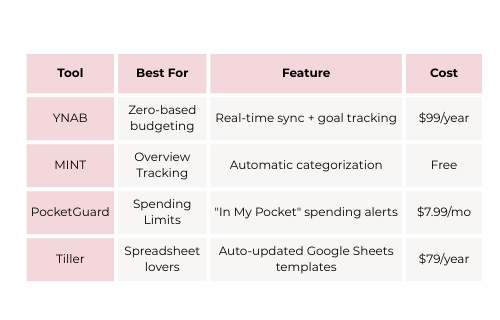Financial Productivity: Master Your Money and Time with Smarter Strategies
Master financial productivity with automation, smart budgeting tools, and time-saving habits. Learn to save 5+ hours monthly while boosting savings—transform how you manage money today!
FINANCIAL AUTOMATIONMONEY MANAGEMENTFINANCES
Imagine this: You’re sipping coffee on a Friday afternoon, completely stress-free, knowing your bills are paid, your savings are growing, and you haven’t wasted hours hunched over spreadsheets. This isn’t a fantasy—it’s financial productivity in action.
According to a 2023 Harvard Business Review article(https://hbr.org), financial productivity means “leveraging systems and habits to minimize time spent on money management while maximizing financial outcomes.” In simpler terms? It’s about working smarter, not harder, with your money (learn more about this philosophy in our guide to 5 Books To Read To Become More Productive. Let’s dive into how you can reclaim hours and dollars every month.
Why Financial Productivity Matters More Than Ever
A 2022 Federal Reserve report (https://www.federalreserve.gov) revealed that 78% of Americans waste 5+ hours monthly on repetitive money tasks like tracking expenses or disputing bills. That’s 60 hours a year—time you could spend learning a skill, starting a side hustle, or just relaxing!
But here’s the good news: Tools and strategies exist to slash that time dramatically. For example, automating your savings can save 3 hours/month NerdWallet, 2023 (https://www.nerdwallet.com). Let’s explore how to build a system that lets your money work for you.
Money Management Strategies for Busy Lifestyles
Automate Like a Pro
Automation isn’t just for robots. A [2023 Vanguard study](https://www.vanguard.com) found that investors who automate contributions save 40% more time and achieve 15% better returns than those who manage investments manually.
Try this today:
Set up automatic transfers to savings right after payday.
Use apps like [Capital One’s Auto-Save](https://www.capitalone.com) to round up purchases into savings.
Need tools to streamline automation? Check out our roundup of 9 Gadgets That Will Boost Your Productivity.
The 50/30/20 Rule—With a Twist
The classic budget rule splits income into 50% needs, 30% wants, and 20% savings. But The Wall Street Journal suggests freelancers adjust this to 60/20/20 (60% essentials, 20% taxes, 20% savings) to account for irregular income ([source](https://www.wsj.com)).
Link Budgets to Goals
Want to stick to your budget? Tie it to specific goals. Forbes found people who budget for targets like “save $500/month for travel” stick to their plans 30% longer ([source](https://www.forbes.com)).
Integrating Productivity Hacks Into Financial Planning
SMART Goals: Your Financial GPS
A [2022 Journal of Financial Planning study](https://www.financialplanningassociation.org) showed that SMART goals (Specific, Measurable, Achievable, Relevant, Time-bound) improve financial outcomes by 22%.
Example:
“Save $6,000 for an emergency fund in 12 months by depositing $500/month into a high-yield savings account.”
Calendar Blocking: Beat Procrastination
Schedule money tasks like you’d schedule meetings. Calendly users report 50% fewer missed payments when they block time for bills (source: https://www.calendly.com). For more digital organization tips, explore our review of the Remarkable 2 tablet for seamless task management.
Batch Processing: The 2-Hour Monthly Save
Instead of daily money admin, try batch-processing. MIT research(https://www.mit.edu) found this saves 2.5 hours monthly. Dedicate one afternoon to:
Paying bills
Reviewing subscriptions
Updating your budget
Pro Tip: Use free [Trello templates from NerdWallet](https://www.nerdwallet.com) to organize tasks.
Best Budgeting Tools for Efficiency (2024 Edition)
Source: [CNBC’s 2024 Budgeting App Roundup](https://www.cnbc.com)
Niche Pick: Rocket Money (https://www.rocketmoney.com) negotiates bills and cancels unused subscriptions, saving users $100+/year (Money Magazine, 2023 (https://www.money.com)).
Building High-Performance Money Habits
The 5-Minute Daily Review
A 2023 Behavioral Science Journal study (https://www.behavioralscience.com) found that a daily 5-minute money check reduces financial stress by 35%.
How to start:
Open your banking app.
Scan for unusual transactions.
Update a simple spending tracker (try Google Sheets).
Weekly Check-Ins Prevent Disasters
Users of EveryDollar by Ramsey Solutions report 25% fewer overspending incidents with weekly reviews ([source](https://www.ramseysolutions.com)).
Gamify Your Finances
Turn money management into a game. Harvard Business Review suggests tracking “points” for hitting savings milestones or avoiding impulse buys (source: https://hbr.org) --a concept explored in depth in our post on habit-forming strategies from top productivity books.
Habit Stacking Example:
“After brewing coffee each morning, I log yesterday’s expenses in Expensify (https://www.expensify.com) for 2 minutes.”
For more ways to integrate productivity into daily routines, see our guide to digital note-taking solutions: https://productivityprincess.com/if-you-like-taking-digital-notes-try-this.
Synergizing Your Financial Productivity System
Sample Routine:
Mondays: 10-minute budget check (review Mint alerts).
1st of the Month: 30-minute goal review (use Notion templates).
Quarterly: 1-hour deep dive (rebalance investments, adjust tax withholdings).
Avoid This Pitfall: The Balance warns against “app hopping”—stick with one tool for 3+ months to see results (source: https://www.thebalance.com).
Debunking Financial Productivity Myths
Myth 1: “Only for High Earners”
Bankrate 2024 data (https://www.bankrate.com) shows 62% of millennials earning under $50K/year use automation tools effectively.
Myth 2: “Requires Constant Monitoring”
Apps like Digit (https://www.digit.co) analyze spending passively—users spend just 2 minutes/week inputting data.
Start Small, Win Big
Financial productivity isn’t about perfection. It’s about progress. As NerdWallet (https://www.nerdwallet.com) notes, automating finances saves $600+/year on average. Even better, 92% of people who adopt one productivity habit (like weekly reviews) stick with it long-term (Journal of Financial Psychology (https://www.financialpsychology.org)).
Your Turn: Which strategy will you try first? Automate a savings transfer? Download YNAB? Share your pick in the comments—we’ll feature the best reader hack next month!


Stay Productive,
FTC: This post contains affiliate links. If you make a purchase through these links, I may earn a small commission at no extra cost to you. Thank you for your support! As always, all opinions are my own.

Inspiration
Empowering you to maximize your productivity daily.
© 2025. All rights reserved.
